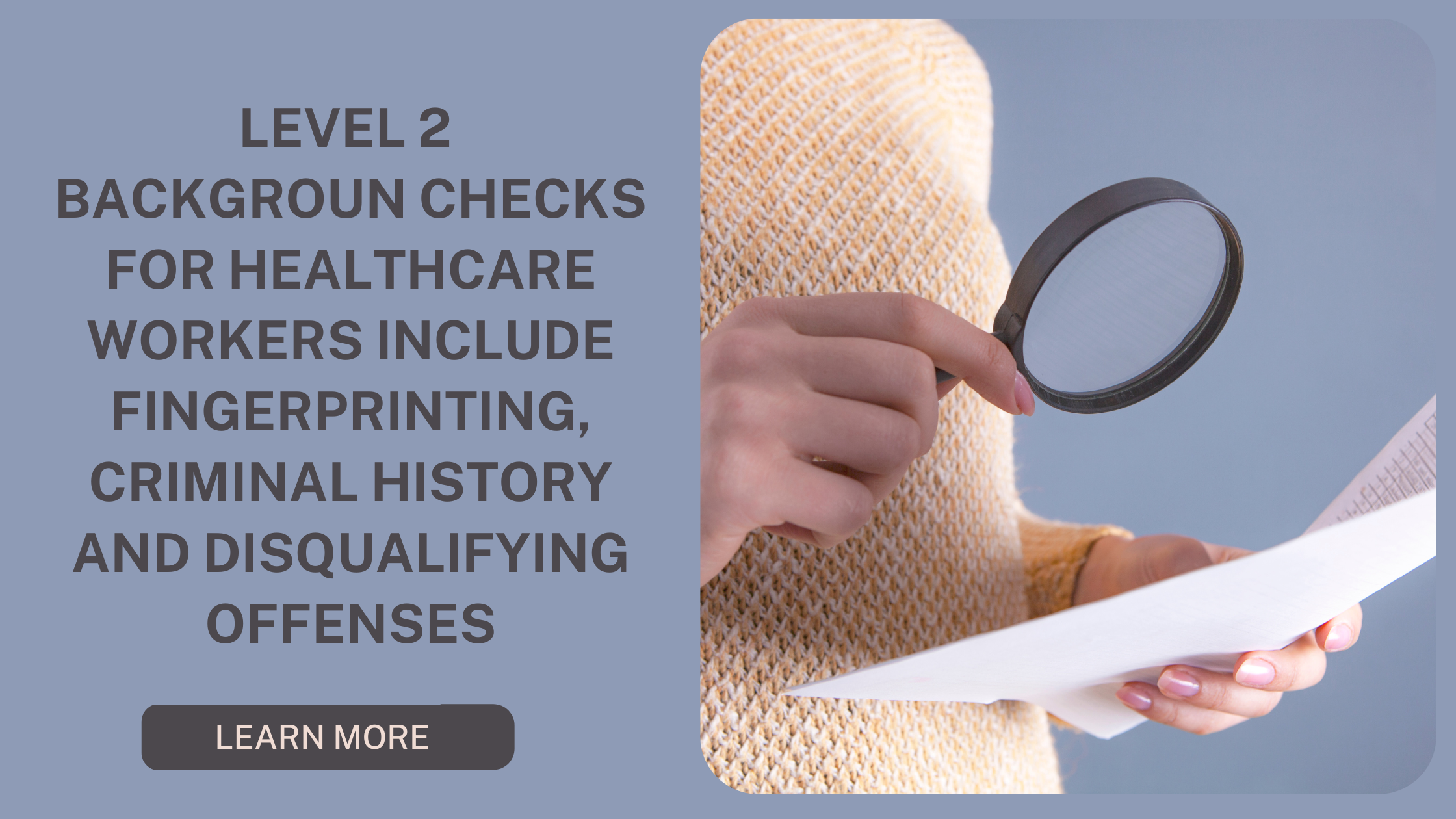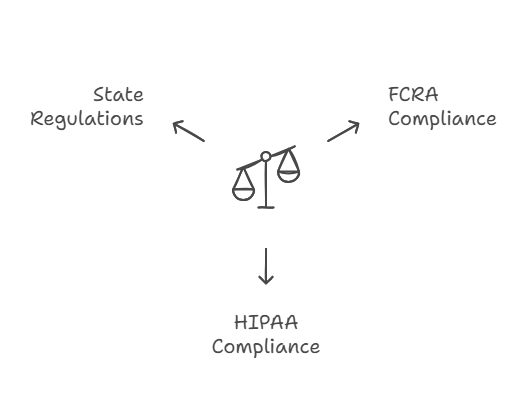What is a Level 2 Background Check for Healthcare Workers?
In the healthcare industry, protecting the safety and well-being of patients is of paramount importance. This responsibility not only extends to the care that patients receive but also to the professionals responsible for providing that care. To ensure the integrity and safety of healthcare environments, organizations often implement thorough vetting processes for their employees. One critical aspect of this vetting process is the Level 2 background check.
A Level 2 background check is a more comprehensive screening process that goes beyond the standard checks performed during a basic background investigation. It is designed to provide employers, particularly in healthcare settings, with a more in-depth view of a candidate’s history. This allows healthcare facilities to ensure that only qualified, trustworthy, and safe professionals are placed in sensitive and responsible roles. This type of background check plays a critical role in protecting both the patients and the institution itself from potential risks.
Level 1 vs. Level 2 Background Checks: What’s the Difference?
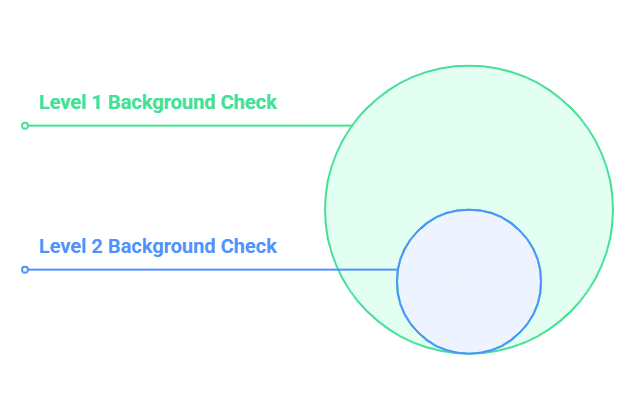
To understand the significance of a Level 2 background check, it’s essential to first distinguish between a Level 1 and Level 2 background check.
- Level 1 Background Check: Typically, a Level 1 background check is the standard process for screening candidates. It usually includes basic criminal record checks for felonies and misdemeanors within the state or federal jurisdictions. This check helps employers identify any past criminal activity that may pose a risk to the workplace. Level 1 checks may also cover national databases to check for other criminal activities that may have occurred outside of the candidate’s immediate area.
- Level 2 Background Check: A Level 2 background check, on the other hand, is far more exhaustive. It includes not only a national and state criminal history check but also fingerprinting, verification of professional licenses, employment history, and checks against databases such as the sex offender registry. It is a more thorough process that aims to uncover more detailed information about an individual’s history, particularly information that may not be readily available in a typical criminal background check.
For healthcare workers, who often deal with sensitive patient data and provide care to vulnerable populations, a Level 2 background check is essential to maintain safety and trust. The additional steps involved in Level 2 checks are designed to eliminate any risks that might compromise patient care or facility integrity.
Why Are Level 2 Background Checks Essential for Healthcare Workers?
Healthcare workers interact with patients in a variety of ways, whether they are providing direct medical care, administrative support, or assistance in other areas of the healthcare system. Given the nature of the work, healthcare professionals must be vetted thoroughly to ensure they have the qualifications, character, and history that align with the values of the healthcare organization.
Patient Safety and Trust: The primary reason for conducting comprehensive background checks is patient safety. Healthcare facilities deal with vulnerable populations, such as the elderly, children, individuals with disabilities, and patients suffering from chronic or life-threatening illnesses. A healthcare worker who has a history of criminal behavior, especially those involving violence, theft, or sexual offenses, can pose a risk to these populations. A Level 2 background check helps employers identify any such potential risks and ensures that individuals working in healthcare environments have passed a more thorough screening process.
Ensuring Compliance: Beyond the ethical and safety reasons for conducting these checks, healthcare facilities are also bound by state and federal regulations that mandate specific background checks for individuals in certain roles. Non-compliance with these laws could lead to legal repercussions, including fines, loss of licenses, and lawsuits. Conducting a Level 2 background check ensures that employers meet these regulatory standards and protect both the organization and the individuals it serves.
Protecting the Healthcare Institution’s Reputation: A healthcare institution’s reputation is built on trust—trust from its patients, employees, and the public. If a worker with a criminal history is hired without proper vetting, and that worker subsequently causes harm, the institution’s credibility can suffer. Performing a thorough background check mitigates this risk and safeguards the healthcare provider’s reputation, which is essential for maintaining a strong relationship with the community and stakeholders.
Key Components of a Level 2 Background Check

A Level 2 background check typically includes several key components that provide healthcare employers with an in-depth look at a candidate’s history. These components can vary slightly based on state and industry requirements, but generally, they include the following:
- Criminal History Check: One of the most fundamental components of a Level 2 background check is a search of both federal and state criminal databases. The criminal history review ensures that the candidate does not have any violent, felony, or misdemeanor convictions that could pose a threat to patient safety or the healthcare environment. This also includes any arrests or charges that could reveal a pattern of criminal behavior.
- Fingerprinting: Unlike a Level 1 background check, which may not require fingerprinting, a Level 2 check mandates that the candidate provide fingerprints. These prints are submitted to the FBI and other relevant databases for a nationwide search. This step is essential in uncovering any criminal activity or convictions that might not show up in a standard name-based check.
- Sex Offender Registry Check: Healthcare facilities, particularly those that provide care to children, the elderly, or other vulnerable individuals, must be vigilant in ensuring their workers do not have a history of sexual offenses. A Level 2 background check includes a review of sex offender registries to ensure that the candidate is not listed.
- Professional License Verification: Many healthcare roles require specific professional licenses or certifications to practice legally. A Level 2 check often includes verification of these licenses to confirm that the candidate holds the necessary credentials and that they have not been revoked or suspended due to ethical violations, malpractice, or other concerns.
- Employment History Verification: A Level 2 check may also involve verifying a candidate’s previous employment history. This helps employers confirm that the individual has the experience they claim to have, as well as to assess the quality of that experience. In some cases, employers may also contact former employers to check references and gain insight into the individual’s professional conduct.
- Education Verification: Depending on the role, verifying educational credentials can be an important aspect of a Level 2 background check. This step ensures that the candidate has the appropriate academic qualifications to perform the tasks required in their job.
- Drug Screening: While not always a part of every Level 2 check, many healthcare employers require drug screenings for potential hires to ensure that they are physically and mentally capable of performing their duties without being impaired by substances.
Who Requires Level 2 Background Checks in Healthcare?
Level 2 background checks are typically required for individuals in roles that involve direct patient care or handling sensitive patient information. These checks are mandatory for healthcare workers who have regular interaction with vulnerable populations, such as the elderly, children, or individuals with disabilities.
Some specific healthcare roles and facilities that commonly require Level 2 background checks include:
- Doctors: Physicians are responsible for making critical decisions that can affect patients’ health and well-being. A Level 2 background check ensures they have the necessary credentials and a clean criminal record.
- Nurses: Nurses provide daily care to patients and often serve as the main point of contact for individuals receiving medical treatment. Ensuring that nurses have passed a Level 2 background check helps maintain the safety and trust of patients.
- Medical Technicians: Lab technicians and other medical professionals working behind the scenes must also undergo a thorough background check, especially if they handle sensitive data or equipment.
- Caregivers in Long-Term Care Facilities: Caregivers working in nursing homes, assisted living facilities, or other long-term care settings must pass Level 2 background checks to ensure they do not pose a risk to the residents they care for.
- Home Health Aides: Workers who provide in-home care to patients, including those recovering from surgery or suffering from chronic illnesses, are often subject to Level 2 background checks to ensure they are trustworthy and competent.
The Importance of State and Federal Compliance
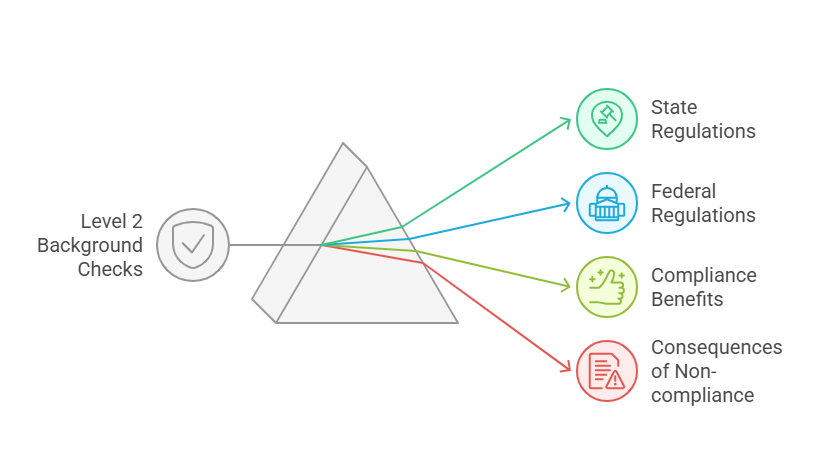
Healthcare employers must also be aware of the state and federal regulations that mandate Level 2 background checks for specific roles. Different states have their own rules regarding which healthcare positions require a Level 2 background check and what components need to be included in the screening. For example, states such as Florida and Texas require more stringent background checks for healthcare workers who work with vulnerable populations.
By conducting Level 2 background checks, healthcare organizations ensure compliance with these state and federal regulations, protecting both their patients and their institution. Non-compliance can lead to penalties, including fines or the revocation of a healthcare provider’s license.
Understanding the Process and Importance of Level 2 Background Checks for Healthcare Workers
Level 2 background checks are critical in ensuring the safety and security of patients, healthcare workers, and healthcare institutions. These checks are more comprehensive than the standard background screenings (Level 1) and include several additional steps to verify a candidate’s criminal history, professional qualifications, and previous employment. Understanding the process behind these checks, as well as their significance in healthcare, is crucial for both employers and potential employees in the industry. This section delves into the details of how Level 2 background checks are performed, their importance for healthcare organizations, and the factors that influence the effectiveness of these screenings.
The Process of a Level 2 Background Check
The Level 2 background check process for healthcare workers is more extensive than a Level 1 check and involves several steps that aim to provide a complete picture of a candidate’s history. From submitting personal information to conducting fingerprinting, these checks ensure that only qualified and trustworthy professionals are hired for critical roles in healthcare environments.
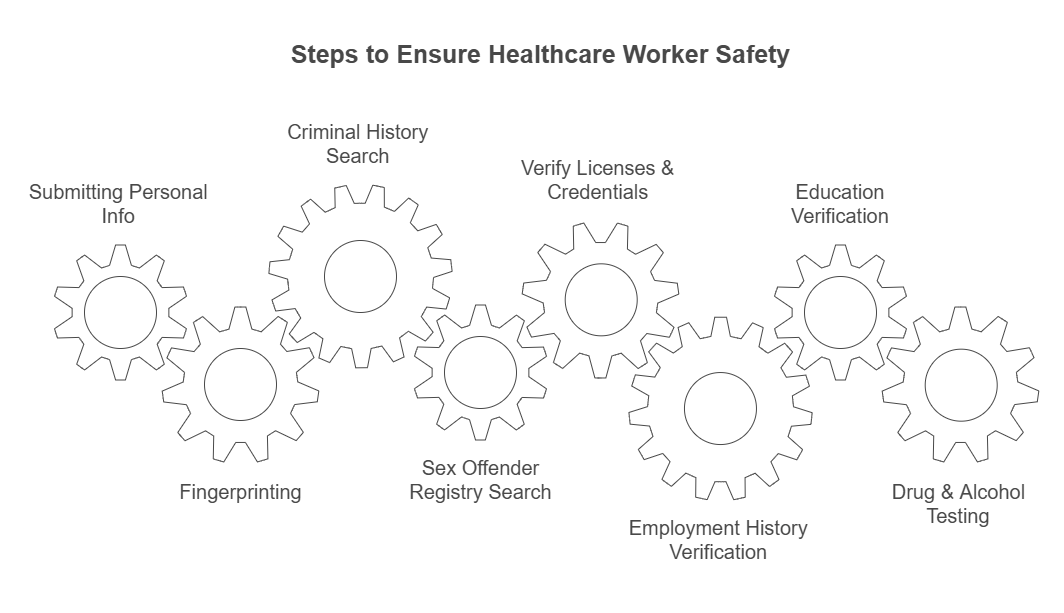
- Submitting Personal Information: The first step in the Level 2 background check process involves the candidate submitting personal information such as full name, date of birth, Social Security number, and current address. This basic information allows the background check provider to begin the process of verifying the candidate’s identity and historical records.
- Fingerprinting: A key component of the Level 2 background check process is fingerprinting. Candidates must visit a designated fingerprinting center, where their fingerprints are taken and sent to state and federal databases for further analysis. The fingerprints are checked against criminal records in various databases, including the FBI and state-specific criminal history records. This step helps identify any criminal activity that may not be visible through a name-based search alone, ensuring that potential healthcare workers are thoroughly vetted for past offenses.
- Criminal History Search: After fingerprinting, the candidate’s criminal history is examined at both the state and federal levels. The criminal check includes the search for felonies, misdemeanors, and any history of violent crimes, drug offenses, theft, or sexual misconduct. This step is critical, as healthcare workers often interact with vulnerable populations. Any history of violent behavior or criminal activity can pose a significant risk to patients and the institution.
- Sex Offender Registry Search: In addition to criminal history checks, Level 2 background screenings include a search of the national sex offender registry. This is particularly important in healthcare settings where workers have access to vulnerable groups such as children, the elderly, or individuals with disabilities. Ensuring that candidates do not have a history of sexual offenses is essential to protect patients and uphold the integrity of healthcare institutions.
- Verification of Professional Licenses and Credentials: Healthcare workers must hold valid professional licenses or certifications to work in their respective fields. As part of the Level 2 background check process, these licenses are verified through official channels. Employers check that the candidate’s medical certifications are valid and up-to-date, and that they are not involved in any legal actions that may threaten their ability to practice legally. This step ensures that healthcare workers have the required education and credentials to perform their duties competently and legally.
- Employment History Verification: The next step involves verifying the candidate’s previous employment history. Employers typically contact prior employers to confirm the duration of employment, job responsibilities, and overall performance. This helps verify that the candidate has the necessary experience and qualifications for the role they are being considered for. Additionally, it provides an opportunity for employers to assess the individual’s work ethic, behavior, and attitude toward patient care.
- Education Verification: For many healthcare positions, verifying a candidate’s educational background is also part of the Level 2 check. Educational verification involves confirming that the candidate has completed the required degree programs or certifications for their field. This can include verifying medical school degrees for doctors, nursing degrees for nurses, or specialized certifications for healthcare technicians.
- Drug and Alcohol Testing: While not always a required part of the Level 2 background check process, many healthcare employers include a drug and alcohol screening to ensure that potential employees are fit for duty. This is particularly important in healthcare settings where employees need to be alert, focused, and capable of performing medical tasks without being impaired by substances. The results of these screenings ensure that healthcare workers can safely care for patients without the risk of substance abuse interfering with their job performance.
The Importance of Level 2 Background Checks in Healthcare
Level 2 background checks are an integral part of the hiring process in healthcare settings, and their importance cannot be overstated. Here’s why they are critical for both healthcare institutions and patients:
- Ensuring Patient Safety: Healthcare workers often interact with vulnerable populations, such as children, elderly individuals, or patients with severe medical conditions. A worker with a criminal history or unethical past can pose a serious threat to these vulnerable individuals. Level 2 background checks help prevent individuals with violent criminal histories or histories of abuse from being placed in positions where they could potentially harm patients.
- Compliance with Legal and Regulatory Requirements: Many states and regulatory bodies have specific legal requirements for healthcare organizations regarding background checks. Certain healthcare roles, such as those in nursing homes or facilities dealing with minors or vulnerable adults, require Level 2 background checks as a standard part of hiring. Failure to comply with these regulations could result in fines, legal actions, or loss of certification. By conducting Level 2 background checks, healthcare employers ensure they meet these legal requirements and protect their organization from legal consequences.
- Building Trust with Patients: Trust is essential in the healthcare industry. Patients trust healthcare workers with their lives, their health, and sometimes their most intimate concerns. Knowing that healthcare providers conduct thorough background checks on their employees fosters patient confidence in the facility. Patients are more likely to feel safe and secure when they know that the individuals caring for them have been thoroughly vetted.
- Preventing Fraud and Misrepresentation: Healthcare workers must adhere to the highest standards of professionalism and ethics. Unfortunately, the healthcare sector is sometimes a target for individuals attempting to fraudulently obtain jobs or misrepresent their qualifications. A Level 2 background check helps verify that candidates have the appropriate education, training, and work history, preventing individuals from entering the profession with fraudulent credentials or intentions.
- Reducing Liability: Healthcare institutions face significant liability risks if they hire individuals who later prove to be unsuitable for the job. If an employee causes harm to a patient or engages in unethical behavior, the healthcare provider can be held legally responsible. Conducting thorough Level 2 background checks mitigates this risk by ensuring that only qualified and ethical individuals are hired.
Factors Affecting the Effectiveness of Level 2 Background Checks

Several factors can influence the effectiveness and accuracy of Level 2 background checks in healthcare. Understanding these factors can help employers ensure they are conducting the most thorough and reliable screenings possible.
- Technology and Database Access: The use of technology and comprehensive databases plays a significant role in the speed and accuracy of Level 2 background checks. Employers often rely on third-party providers that have access to national criminal databases, fingerprint verification systems, and other resources to streamline the process. The more expansive and up-to-date the database, the more accurate the check will be.
- State vs. Federal Database Access: While Level 2 background checks typically search both state and federal databases, the scope of these searches can vary. In some cases, certain criminal records or data points might not be available across state lines. This can lead to incomplete background checks unless the employer ensures that both state and federal data are fully accessible.
- Manual Verification: In addition to using databases, manual verification of records can sometimes be necessary. While databases are efficient and comprehensive, they are not infallible. It may be necessary to verify specific details, such as professional license status or employment history, by directly contacting previous employers or licensing boards. This manual verification process can sometimes be time-consuming but adds an additional layer of security and confidence in the background check.
- Compliance with Regulations: Level 2 background checks must comply with both state and federal regulations, which can vary significantly depending on the healthcare sector. Ensuring that the check process adheres to these regulations is essential to avoid legal repercussions. It’s also important to obtain the candidate’s consent before conducting a background check, as required by the Fair Credit Reporting Act (FCRA).
- Turnaround Time: The speed at which background checks are processed can vary depending on the depth of the check and the databases used. Fingerprinting can sometimes slow down the process, particularly if the records are not immediately available or if there are delays in processing. However, most organizations aim to complete Level 2 background checks within a few weeks to prevent delays in the hiring process.
Streamlining the Background Check Process
Healthcare organizations face the challenge of conducting background checks efficiently while ensuring compliance with state and federal regulations. This can be especially time-consuming, given the detailed nature of Level 2 checks. RapidHireSolutions helps healthcare organizations streamline the process by providing accurate and compliant background screening services. With their expertise, healthcare employers can quickly and efficiently verify criminal history, professional licenses, and employment background. RapidHireSolutions uses state-of-the-art technology and provides manual verification when necessary, ensuring that healthcare organizations meet all regulatory requirements while reducing processing times.
Data Table: Components of a Level 2 Background Check for Healthcare Workers
| Component | Description |
|---|---|
| Criminal History Check | Search of state and federal databases to identify criminal convictions. |
| Fingerprinting | Submission of fingerprints to FBI and other databases to verify identity and check criminal records. |
| Sex Offender Registry Check | Search of the national sex offender registry to ensure safety in healthcare environments. |
| Professional License Verification | Verification of required healthcare licenses and certifications. |
| Employment History Verification | Contacting previous employers to confirm work history and performance. |
| Education Verification | Confirming educational background and credentials. |
| Drug Testing | Testing for illegal substances to ensure fitness for duty. |

